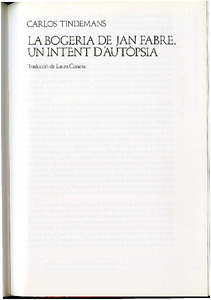La bogeria de Jan Fabre. Un intent d'autòpsia

Visualitza/
Metadades
Mostra el registre d'unitat complet
Estudis escènics: quaderns de l'Institut del Teatre. 1988, Núm. 29
Tipus de documentArticle
Abstract
<p>Jan Fabre's theatre is constructive, an unfinished and openended event or, rather, an accumulation of concurrences. Fabre believes in a theatre that by and through its own possibilities structures the imagination of the spectator. He refrains from an ideological content, does not orient, does not define anything, does not tie himself down to anything. On the contrary, he plays with visualising the changes in individuals and society, those trying to stir the spectator.</p>
<p>Fabre's actors are not professionally trained. They do not act a text, but they are markers of images and use an easely recognizeble code of gestures.</p>
<p>Visual percetion dominates aural perception; however, aural perception is more than a merely substructural accompaniment. Both replace the linguistic foundation of the conventional idiom of theatre. In Fabre's theatre, gesture, breath, gaze 160 and any other bodily possibilities actas conditions of content. Fabre's nonliterary text material is composed of quotationlike descriptions of titles of famous theatre productions and it approaches the quality of advertisement slogans and textual ready-mades.</p>
<p>Fabre takes away from all theatrical means (staging, lighting, setting, costtiming) their ability of producing any likelihood, power of reference or transferability towards the experience and the memories of the spectator. He refuses programatically any thematic linearity, so that the acting, what is gradually and without any over-emphasizing presented to the spectator throughout the performance, becomes the theme.</p>
Condicions d'accésAccés obert
ISSN2385-362X
,
0212-3819
Col·leccions
- 1988: Núm.: 29 [15]

